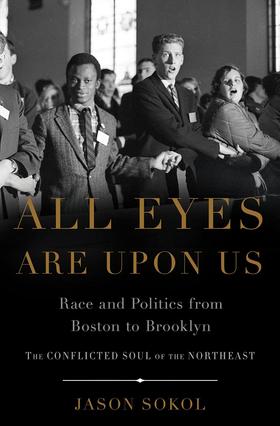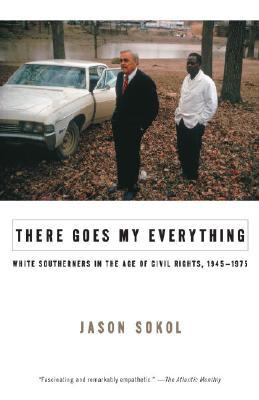Author Interview: Historian Jason Sokol on Race and Massachusetts — From the Red Sox to Springfield
“I think a lot of people around town are fairly aware of the Red Sox’s checkered history in terms of race.”
All Eyes are Upon Us: Race and Politics from Boston to Brooklyn by Jason Sokol. Basic Books, 416 pages, $32.00.
By Blake Maddux

Jason Sokol is an Assistant Professor of History at the University of New Hampshire, where he teaches courses on 20th-century America, African-American history, and the Civil Rights Movement. Born and raised in Springfield, Massachusetts, Sokol graduated from Oberlin College in Ohio and earned his PhD at the University of California, Berkeley.
Professor Sokol’s first book, There Goes My Everything: White Southerners in the Age of Civil Rights, was published in 2006 by Alfred A. Knopf. In December 2014, Basic Books published All Eyes are Upon Us: Race and Politics from Boston to Brooklyn.
Among the topics that Sokol discusses in his new book are a radical attempt at school integration in his hometown several decades before his birth, the struggle of the first African-American player in Major League Baseball to buy the house of his choice, and the inspiring stories of Shirley Chisholm, the first African-American woman to take a seat in the United States Congress, and Edward Brooke, the first African-American to win election to the U.S. Senate by popular vote. (Senator Brooke died Saturday morning at the age of 95.)
Sokol spoke to The Arts Fuse by phone ahead of his visit to Brookline Booksmith on Wednesday, January 7.
Arts Fuse: Are All Eyes are Upon Us and There Goes My Everything opposite sides of the same coin?
Jason Sokol: I am from Springfield, Mass, so I have always been interested in race in the North. I had always been interested in race and African-American history, so I thought that the South was the place to start to really understand what was going on in terms of America’s racial history. But the whole time that I was working on that project, I didn’t stop thinking about where I was from.
The first book focuses a little more on white Americans and white Southerners and how they experienced the Civil Rights Movement. But I see both books as interracial histories, that is, understanding how the African-American struggle influenced white Americans and vice versa. And whereas the first book in effect tried to cover the entire South, this book is centered on Massachusetts, New York, and Connecticut. The second book also has a longer time frame since I try to bring it all the way up to the present, or at least up to Obama’s reelection in 2012.
So it’s not wrong to call them the other side of the same coin or whatever. But to me, at least how I conceptualized it, they had differences in those respects.
AF: As a native of the city, did you know about the Springfield Plan, which you discuss in the first chapter of All Eyes are Upon Us?
Sokol: It’s nothing that I had ever heard of. I don’t think that anyone in Springfield, at least of my generation, has any idea that Springfield was the site of this grand experiment during World War II. Nor do many people of my generation have the knowledge that Springfield was the site of some civil rights struggles, which I write about, during the 1960s. Both of those things were complete surprises to me. There are some old-timers in Springfield who remember those things, but they’re not really part of the city lore that’s passed down or anything like that.
AF: That seems surprising considering what a bold experiment it was and how much national attention it got.
Sokol: It was a big deal at the time for a few years. Those wartime years were pretty unique in the American experience. Americans were urgently pressed together and fighting the Nazi foe. It provided the context for this rather amazing experiment at home. Warner Bros. made a short movie about it called It Happened in Springfield. Viking and Barnes & Noble both put books out about it. So it was a big deal at the time, but it was also very fleeting.

Historian Jason Sokol — “I am from Springfield, Mass, so I have always been interested in race in the North.”
AF: I was not aware that the Red Sox had the opportunity to sign Jackie Robinson, Jr. Do you think that his experience as a prominent African-American would have been similar in Boston to what it was in New York City and its suburbs?
Sokol: Some historians have looked back and said that there was no way Boston would have ever signed Jackie Robinson because Boston in 1945 – when Robinson was trying out for the Red Sox – was a pretty insular place. It had a very small black population, a very small population of racial minorities, so it did not have the racial and ethnic and religious make-up of a place like Brooklyn, which was pretty polyglot, where Robinson was able to make his breakthrough.
I quote an African-American sports writer named Doc Kountze. He was a black sportswriter in Boston, and he really thought that the Red Sox were going to maybe give Robinson and the others who tried out with him a fair shake. He thought that Boston had this abolitionist heritage and maybe it was the place where the great breakthrough would actually happen.
But of course, anyone who knew more about Tom Yawkey and the Red Sox owners and general managers would have known that Yawkey was a racist guy and never really had any intent of signing Robinson. But you know, Robinson had plenty of troubles in even supposedly cosmopolitan New York City, especially when he wanted to buy a home in the suburbs of Westchester and Connecticut. So I can’t imagine he would have been greeted more warmly in Boston and the surrounding area.
AF: It sounds like maybe the street outside of Fenway Park should be named after somebody else.
Sokol: I would say that it certainly wouldn’t hurt for the Red Sox organization to undertake a more public reckoning with that side of the organization’s history, although I think a lot of people around town are fairly aware of the Red Sox’s checkered history in terms of race.
You can certainly quote me as saying that the Red Sox have a shameful history in dealing with African-American players. And I would say a lot of that is due to Yawkey and his racial preferences.
AF: What was it about the Republican Party of the mid-20th century that made Jackie Robinson and Edward Brooke II and Edward Brooke III members?

Sokol: In terms of Brooke’s father, the Republican Party was the party of Abraham Lincoln and the Democrats were the party of white Southern segregationists, which was true all the way up until the Civil Rights Movement of the 1960s. Many African-Americans saw the historic tie to the Republican Party. The Democratic Party was the home of Strom Thurmond and all of the Southern segregationists.
Ed Brooke, when he first ran for office, filed for the nomination of both parties, which you could do at that time. The Democratic Party in Boston and in Massachusetts was very much run by the old Democratic Irish Catholic machine basically. And they weren’t about to nominate this newcomer whether he was African-American or not. He was a newcomer from Washington D.C., [where he was born] and he wasn’t part of the party organization.
But the Republicans were a party that was a little more open, so Brooke won their nomination and decided to be a Republican. At that time in American history a lot of African-American voters were on the fence because the history of the Democratic Party was segregationist, but at the same time the Democrats were also the party of FDR and they were starting to be the party of liberalism and progressivism.
Brooke was a liberal Republican, which was a breed that existed, especially in the Northeast in the 1950s and 60s.
AF: It was interesting to learn that Edward Brooke butted heads on the issue of school busing with a young man from Delaware named Joe Biden. Did Biden ever have to answer for his anti-busing views?
Sokol: Biden was on the side of American public opinion on that issue and he probably still is. Most Americans, certainly the vast majority of white Americans, view school busing as an abject failure today, and they viewed it that way in the 1970s as well. So Biden in the very beginning of this saga had announced some support for school desegregation, but he quickly learned that that was earning him the ire of his constituents in Delaware, so he quickly moved against that. Biden has always been a very good politician who understands how to stay in office. So on this issue he picked out where the pulse of the country was, and that was certainly an anti-busing pulse. And that’s what he went with.
AF: Busing was never enthusiastically embraced by public officials either, right?
Sokol: Busing was the last resort, even by the people who supported it. African-American parents were not crazy about having their kids bused into South Boston High. They knew that their kids would not be greeted with open arms. But the alternative for them was to have their kids stay in the underfunded and segregated schools in their own neighborhood. That was clearly not providing those African-American students with an equal opportunity at education.
It came to a point where busing was the only solution but that’s only because the white leaders of Boston were so intransigent in terms of refusing to come up with any other more palatable or gradual solution and thereby allowing the problem to worsen for so many years. One could imagine a history in which after the Racial Imbalance Act [1965] was passed, the leaders had worked to try to solve that problem rather than working to deepen it. Who knows if they would have solved it?
Blake Maddux is a freelance journalist and regular contributor to DigBoston and The Somerville Times. He recently received a master’s degree from Harvard Extension School, which awarded him the Dean’s Thesis Prize in Journalism. A native Ohioan, he moved to Boston in 2002 and currently lives with his wife in Salem, Massachusetts.
